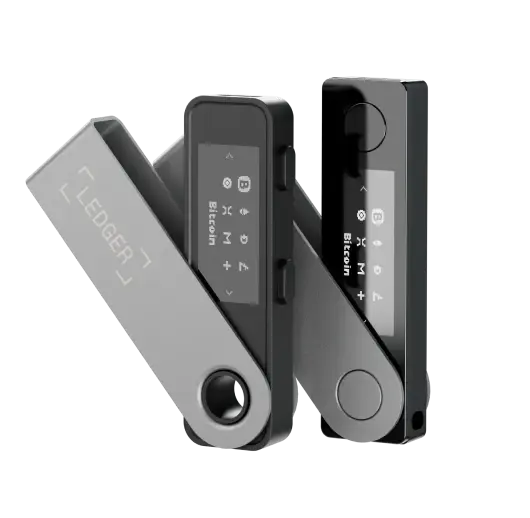Compare Ledger signers
Get a Ledger Nano
Select and purchase a Ledger hardware wallet of your choice.
- Beginner in the crypto world? Get started with Ledger Nano S Plus.
- Prefer a Bluetooth connection? Try with Ledger Nano X.
Looking for a Cardano Wallet to buy and store your Cardano? Join 7+ million customers who trust Ledger hardware wallets to securely store their crypto and use them on the day-to-day basis.
Trusted by over 8 million customers

Whether you’re looking to keep your crypto safe for long-term or manage them on a daily basis, Ledger has the right product for you.
Ledger hardware wallet
Ledger hardware wallet stores your private keys and signs transactions offline, making them resistant to malicious attacks and threats. Pair the Ledger crypto wallet with Ledger Live App to manage your Cardano on the go.
Ledger Live App
Ledger Live App is a gateway to manage your assets, checking your real-time balance, tracking transaction histories, and more.

Select and purchase a Ledger hardware wallet of your choice.

Download and install the Ledger Live app in a couple of clicks on desktop and mobile.
Coupled with a Ledger, it makes the most secured wallet for your Cardano.

Add a Cardano account with a couple of clicks. Choose among different providers and easily manage your Cardano.
And not only Cardano. With Ledger Live, you can manage thousands of crypto and a large variety of NFTs.

The most premium secure touchscreen hardware wallet to protect and manage your Cardano.

Designed with accessible sizing, enjoy the all new secure touchscreen user experience to manage your Cardano.

Our classic entry-level hardware wallets built with all the essentials to secure your Cardano.

With Ledger Live coupled with a Ledger, you can:
*Buy, send/receive, swap, stake, and other crypto transaction services are provided by third-parties provider, which availability may vary based on jurisdiction/territory.

You can buy Cardano with a credit/debit card or bank transfer. You can choose from a range of service providers (Paypal, Ramp, MoonPay, Sardine…) and select the option that works best for you.
Your Cardano will land in your Ledger Cardano Wallet.

Cardano is a decentralized platform that will allow complex programmable transfers of value in a secure and scalable fashion. It is one of the first blockchains to be built in the highly secure Haskell programming language. Cardano is developing a smart contract platform that seeks to deliver more advanced features than any protocol previously developed. It is the first blockchain platform to evolve out of a scientific philosophy and a research-first-driven approach. The development team consists of a large global collective of expert engineers and researchers.
Every blockchain project has a token of value commonly referred to as a cryptocurrency. Ada is the cryptocurrency on the Cardano blockchain. With Ada, holders can send value between friends, pay for a good or service, deposit funds on an exchange, or enter an application. To perform a transfer on the settlement layer requires you to own Ada, or acquire Ada through an exchange. It will also be the native token to be used in applications built on the computation layer.
The Cardano Foundation’s core mission is to standardize, protect and promote the Cardano Protocol technology. The Cardano Foundation acts as a supervisory and educational body for Cardano.
Find answers to some of the most common questions.
Related Resources